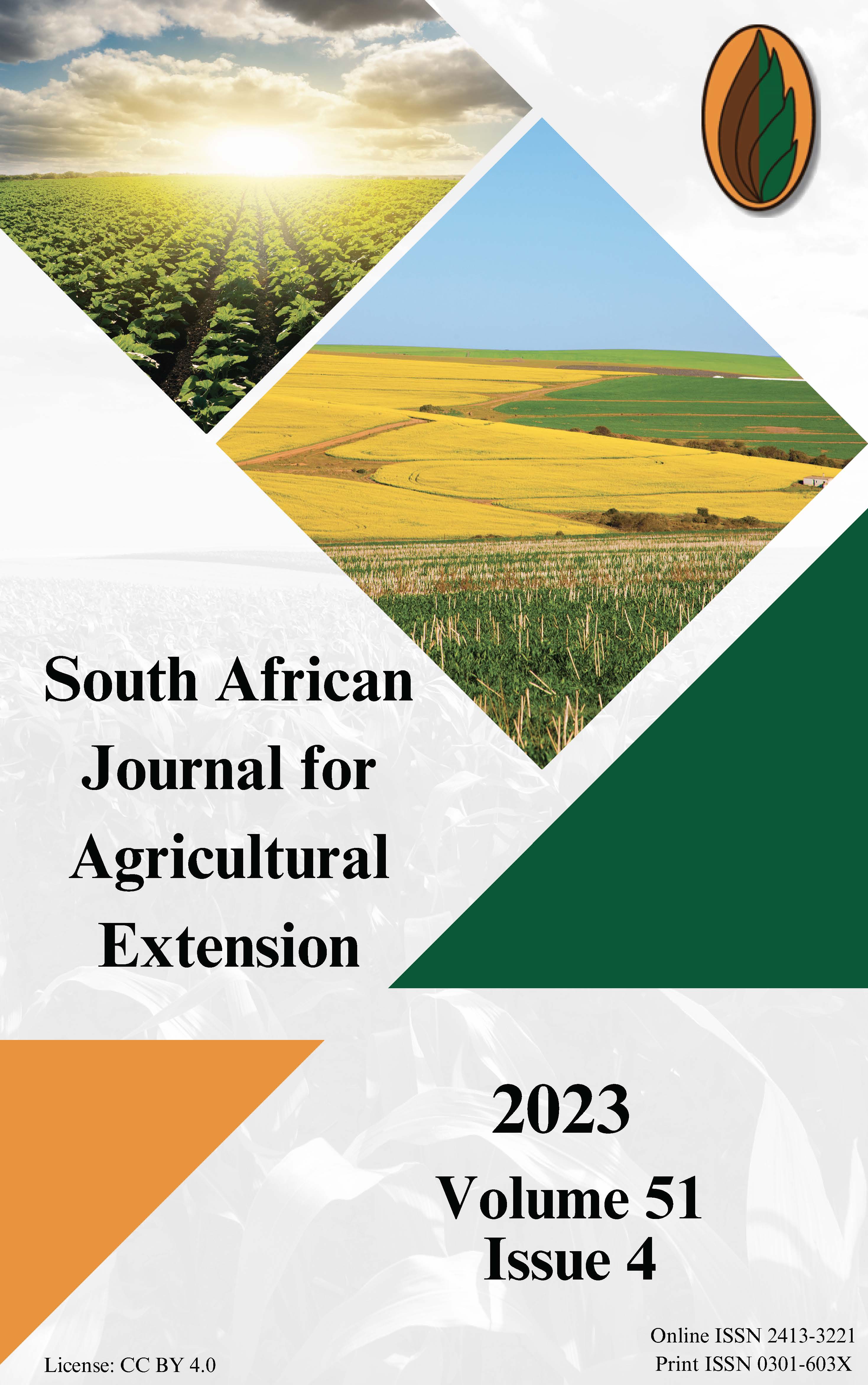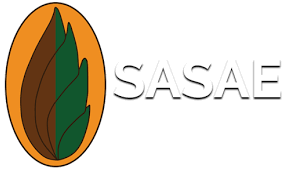Determinants of Climate-Smart Agriculture (CSA) Technologies Adoption by Smallholder Food Crop Farmers in Mangaung Metropolitan Municipality, Free State
DOI:
https://doi.org/10.17159/2413-3221/2023/v51n4a1645Keywords:
Adaptive capacity, Climate-Smart Agricultural practices, Food security, Smallholder farmersAbstract
Climate change is already influencing agricultural production and distribution and heightening farming risks. Over the last decade, the sector has been subject to drastic economic and social evolutions contributing to the climate variability change in the agricultural sector. Smallholder farmers, especially from developing countries (South Africa), have been recognised as the most vulnerable to climate hazards due to the prevalence of low adaptive measures. Addressing climate change’s effects on agriculture is an exceptional challenge. Policymakers have presented Climate-Smart Agriculture (CSA) as an alternative strategy to enhance agricultural productivity, which will help improve food security and reduce poverty, especially in developing countries. However, the adoption and diffusion of CSA have been slow. Therefore, this paper aims to assess the determinants of (CSA) technologies adoption by smallholder food crop farmers in the Mangaung Metropolitan Municipality, Free State.
The study used a cross-sectional research design to collect data using structured questionnaires. Stratified random sampling collected data from 120 smallholder food crop farmers. Descriptive statistics and multinomial logistic regression were employed for the analysis. The study findings show that using and adopting CSA by smallholder farmers
enhanced agricultural productivity. The majority (66%) of the sampled food crop farmers fell in the category of users of CSA practices. The study found that farmers’ knowledge influenced their use and adoption of CSA technologies and farmers’ available financial support. Lack of financial support, knowledge and inadequate farm inputs and training were the challenges limiting smallholder farmers from using CSA. The paper recommends that to ensure a smooth transition to climate-sensitive agricultural practices, development actors must strongly support the inculcation of indigenous knowledge of modern agricultural technologies for easy use by farmers. It also recommends that policymakers develop and implement more elaborate capacity-building programs at the local level to influence farmers’ attitudes towards pro-environmental behaviour.
Downloads
References
ABEGUNDE, V.O., SIBANDA, M. & OBI, A., 2019. The dynamics of climate change adaptation in sub-Saharan Africa: A review of climate-smart agriculture among small-scale farmers. Climate., 7(11): 132. DOI: https://doi.org/10.3390/cli7110132
ABEWOY, D., 2018. Review on impacts of climate change on vegetable production and its management practices. Adv. Crop Sci. Technol., 6(1): 330. DOI: https://doi.org/10.4172/2329-8863.1000330
CRESWELL, J.D., 2017. Research design: Qualitative, quantitative, and mixed methods approaches. Sage publications.
DEPARTMENT OF RURAL DEVELOPMENT AND LAND REFORM (DRDLR)., 2020. Rural Development Plan Mangaung Metropolitan Municipality Implementation Plan
DELONGE, M., MILES, A. & CARLISLE, L., 2016. Investing in the transition to sustainable agriculture. Environ Sci Policy., 55(1): 266-273. DOI: https://doi.org/10.1016/j.envsci.2015.09.013
FOOD AND AGRICULTURAL ORGANISATION (FAO)., 2020. The state of food security and nutrition in the world. Transforming food systems to deliver affordable healthy diets for all. Rome: FAO
GILLER, K.E., HIJBEEK, R., ANDERSSON, J.A. & SUMBERG, J., 2021. Regenerative agriculture: An agronomic perspective. Outlook Agric., 50(1): 13-25. DOI: https://doi.org/10.1177/0030727021998063
INTERNATIONAL PANEL ON CLIMATE CHANGE (IPCC)., 2007. Climate change 2007: Impacts, adaptation, and vulnerability. In M.L. Parry, O.F. Canziani, J.P. Palutikof, P.J. van der Linder & C.E. Hanson (eds.), Contribution of Working Group II to the IPCC fourth assessment report. Cambridge: Cambridge University Press.
INTERNATIONAL PANEL ON CLIMATE CHANGE (IPCC)., 2014. Climate change synthesis report summary for policymakers. Available from https://www.agora-parl.org/sites/default/files/agora-documents/ipcc_2014_synthesis_report_-_summary_for_policy_makers.pdf
ISSAHAKU, G. & ABDULAI, A., 2019. Adoption of climate‐smart practices and its impact on farm performance and risk exposure among smallholder farmers in Ghana. Aust. J. Agric. Resour. Econ., 64(2): 369-420. DOI: https://doi.org/10.1111/1467-8489.12357
KAMARA, A., CONTEH, A.R., RHODES, E.R. & COOKE, R.A., 2019. The relevance of smallholder farming to African agricultural growth and development. African J. Food. Agric. Nutr. Dev., 19(1): 14043-14065. DOI: https://doi.org/10.18697/ajfand.84.BLFB1010
KASSA, B.A. & ABDI, A.T., 2022. Factors influencing the adoption of climate-smart agricultural practice by small-scale farming households in Wondo Genet, Southern Ethiopia. SAGE Open., 12(3). DOI: https://doi.org/10.1177/21582440221121604
KOM, Z., NETHENGWE, N.S., MPANDELI, N.S. & CHIKOORE, H., 2022. Determinants of small-scale farmers’ choice and adaptive strategies in response to climatic shocks in -Vhembe District, South Africa. GeoJournal., 87: 677-700. DOI: https://doi.org/10.1007/s10708-020-10272-7
KOMBA, C. & MUCHAPONDWA, E., 2012. Adaptation to climate change by smallholder farmers in Tanzania. Working Paper No. 299. Available from https://www.econrsa.org/system/files/publications/working_papers/wp299.pdf
MANGAUNG METROPOLITAN MUNICIPALITY., 2016. Mangaung Metropolitan Municipality Environmental Implementation and Management Plan: First Draft. Available from http://www.mangaung.co.za/wp-content/uploads/2021/05/Annexure-B-EIMP.pdf
MDODA, L., 2020. Climate change effects on agricultural productivity in the smallholder farming systems of the Eastern Cape Province, South Africa. J Hum Ecol., 71(1-3): 236-244. DOI: https://doi.org/10.31901/24566608.2020/70.1-3.3260
MDODA, L. & OBI, A., 2019. Analysis of profitability of smallholder irrigated food plots in the Eastern Cape Province of South Africa. J. Agribus. Rural Dev., 53(3): 225-232. DOI: https://doi.org/10.17306/J.JARD.2019.01265
MUJEYI, A., MUDHARA, M. & MUTENJE, M.J., 2021. Adoption patterns of Climate-Smart Agriculture in integrated crop-livestock smallholder farming systems of Zimbabwe, Clim Dev., 14(5): 399-408. DOI: https://doi.org/10.1080/17565529.2021.1930507
MUJURU, N. & OBI, A., 2020. Effects of cultivated area on smallholder farm profits and food security in rural communities of the Eastern Cape Province of South Africa. Sustainability., 12(8): 3272. DOI: https://doi.org/10.3390/su12083272
MUNTAMBARA, S., 2016. Agricultural input supply challenges of smallholder irrigation schemes in Zimbabwe. J. Dev. Agric. Econ., 8(12): 260-271. DOI: https://doi.org/10.5897/JDAE2016-0735
MUSAFIRI, C.M., KIBOI, M., MACHARIA, J., NG'ETICH, O.K., KOSGEI, D.K., MULIANGA, B., OKOTI, M. & NGETICH, F.K., 2022. Adoption of climate-smart agricultural practices among smallholder farmers in Western Kenya: Do socio-economic, institutional, and biophysical factors matter?. Heliyon., 8(1): e08677. DOI: https://doi.org/10.1016/j.heliyon.2021.e08677
MUTEKWA, V.T., 2009. Climate change impacts and adaptation in the agricultural sector: The case of smallholder farmers in Zimbabwe. J. Sustain. Dev. Afr., 11: 237-256.
NHEMACHENA, C., 2008. Agriculture and future climate dynamics in Africa: Impacts and adaptation options. Doctoral dissertation, University of Pretoria.
NASSIUMA, D.K. & MWANGI, J.W., 2004. Statistical methods for information analysis: An introduction. Egerton University Press.
OGUNYIOLA, A., GARDEZI, M. & VIJ, S., 2022. Smallholder farmers’ engagement with climate-smart agriculture in Africa: role of local knowledge and upscaling. Clim. Policy., 22(4): 411-426. DOI: https://doi.org/10.1080/14693062.2021.2023451
OUEDRAOGO, M., HOUESSIONON, P., ZOUGMORE, R. & PARTEY, S., 2019. Uptake of climate-smart agricultural technologies and practices: Actual and potential adoption rates in the climate-smart village site of Mali. Sustainability, 11(17): 4710. DOI: https://doi.org/10.3390/su11174710
OZOR, N., 2009. Understanding climate change: Implications for Nigerian agriculture, policy and extension. Paper presented at the National Conference on Climate change and the Nigerian Environment, 29 June - 2 July 2009, University of Nigeria, Nsukka.
PARTEY, S., ZOUGMORE, R., OUEDRAOGO, M. & CAMPBELL, B.M., 2018. Developing climate-smart agriculture to face climate variability in West Africa: Challenges and lessons learnt. J. Clean. Prod., 187: 285-295. DOI: https://doi.org/10.1016/j.jclepro.2018.03.199
SEROTE, B., MOKGEHLE, S., PLOOY, C., MPANDELI, S., NHAMO, L. & SENYOLO, G., 2021. Factors influencing the adoption of climate-smart irrigation technologies for sustainable crop productivity by smallholder farmers in arid areas of South Africa. Agriculture., 11(12): 1222. DOI: https://doi.org/10.3390/agriculture11121222
SIKWELA, M. & MUSHUNJE, A., 2013. The impact of farmer support programmes on household income and sustainability in smallholder production: A case study of the Eastern Cape and KwaZulu Natal farmers, South Africa. Afr. J. Agric. Res., 8(21): 2502-2511.
SOUTH AFRICAN HISTORY ONLINE (SAHO)., 2019. Mangaung Metropolitan Municipality, Free State. Available from https://www.sahistory.org.za/place/mangaung-metropolitan-municipality-free-state
STATISTICS SOUTH AFRICA (STATSSA)., 2017. Statistical release, Quarterly employment statistics (QES). Available from http://www.statssa.gov.za/publications/P0277/P0277June2017.pdf
TOTIN, E., SEGNON, A., SCHUT, M., AFFOGNON, H., ZOUGMORE, R., ROSENSTOCK, T. & THORNTON, P., 2018. Institutional perspectives of climate-smart agriculture: A systematic literature review. Sustainability., 10(6): 1990. DOI: https://doi.org/10.3390/su10061990
WANGU, J., 2020. Policy brief: Inclusive Agribusiness Contribution to Local Food and Nutrition Security. Available from https://www.researchgate.net/publication/340738706_Policy_brief_March_2020_Inclusive_Agribusiness_Contribution_to_Local_Food_and_Nutrition_Security
WEKESA, B., INGASIA, O. & LAGAT, J., 2018. Effect of climate-smart agricultural practices on household food security in smallholder production systems: Micro-level evidence from Kenya. Agric. Food Secur., 7(1): 10.1186/s40066-018-0230-0. DOI: https://doi.org/10.1186/s40066-018-0230-0
WOOLDRIDGE, J.M., 2002. Econometric analysis of cross-section and panel data. Cambridge: The MIT Press.
ZIZINGA, A., KANGALAWE, R., AINSLIE, A., TENYWA, M., MAJALIWA, J., SARONGA, N. & AMOAKO, E., 2017. Analysis of Farmer’s Choices for Climate Change Adaptation Practices in South-Western Uganda, 1980–2009. Climate., 5(4): 89. DOI: https://doi.org/10.3390/cli5040089
Downloads
Published
Issue
Section
License
Copyright (c) 2023 A. Makamane, J.A. Van Niekerk, O. Loki, L. Mdoda

This work is licensed under a Creative Commons Attribution 4.0 International License.








.png)